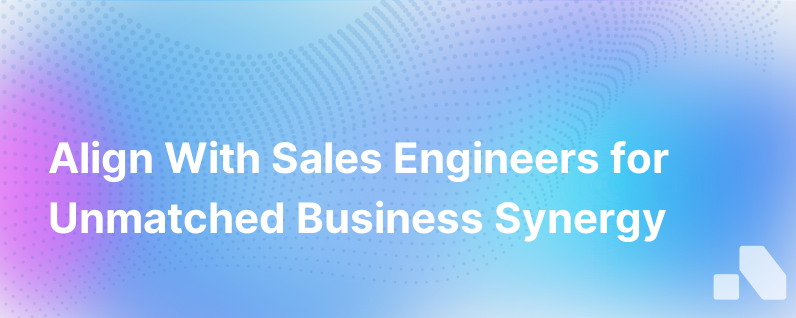
In the dynamic theatre of B2B sales, the role of Sales Engineers (SEs) is often understated, yet they are the linchpin in the conversion process, the unsung heroes who harmonize technical knowledge with sales acumen. SEs or 'Pre-sales engineers' are technical subject matter experts, adept in articulating the value and intricacies of a product to customers. Their deep product knowledge and technical expertise offer invaluable support to a sales team, often making the difference in complex sales scenarios that involve intricate product functionalities or require custom solutions.
Understanding the Role of Sales Engineers
Sales Engineers bridge the gap between the technical and non-technical realms within sales processes. They translate the often complex technical language of a startup's product into clear benefits that resonate with the prospect's business needs. An effective SE joins the sales discussion with a consultative stance, focusing on the customer's challenges and how the product can solve them.
Their toolkit includes product demos, technical presentations, and detailed discussions on the specifics of a product's operation, all aimed at easing a prospect's technical concerns. However, their role stretches far beyond product demonstration. They design, propose, and modify solutions to meet customer requirements, collaborate with product teams on custom requests, and help navigate the technical prerequisites of the sales process.
The Benefits of Aligning with Sales Engineers
Aligning closely with SEs can yield significant benefits for a sales organization. Here's how:
Enhances Credibility and Builds Trust
In B2B sales, trust is the currency of the realm. Clients need to believe not only in the product but also in the people behind it. SEs fortify a sales pitch with authority and credibility. They're well-versed in addressing technical objections and evidencing performance claims, which nurtures customer trust and paves the way for solid business relationships.
Improves Solution Selling
Solution selling is about problem-solving; it's about showcasing your product as the best answer to the prospect’s pain points. SEs have a unique ability to tailor your offerings, ensuring the proposed solutions align with the client's specific needs and management systems. This custom approach demonstrates a deep engagement with the client's situation and often proves decisive in deal-closure.
Interacts with the Post-Sales Experience
Sales Engineers also possess valuable insights on post-sales processes, having hands-on experience with product implementation and troubleshooting. Their involvement in the sales process ensures that promises made during sales are attainable and realistic, which minimizes post-sales friction and enhances customer satisfaction.
Educates and Advocates for Both Sides
A well-informed customer is a more reliable customer. SEs play a crucial role in educating prospects about the product’s value and operations. Simultaneously, they relay customer feedback to product teams, advocating for features or changes that reflect real customer needs.
Acts as a Catalyst for Sales Cycle Acceleration
Given their technical prowess, SEs can rapidly navigate and address the technical validation stages of a sales cycle, which can otherwise be lengthy and fraught with back-and-forth communications. Efficient technical validation circumvents bottlenecks and propels the sales process forward.
Enhances Customer Retention
Satisfied customers tend to stick around, and Sales Engineers contribute significantly to customer satisfaction by ensuring that expectations are clearly set, questions are thoroughly answered, and the product or solution is well understood. This clarity and satisfaction are key drivers of customer retention and upsells.
Engages in Peer-to-Peer Interaction
SEs often have a similar background and language to the technical stakeholders on the customer's side. This peer-to-peer interaction is more persuasive and effective, leading to stronger rapport and a deeper understanding of the customer's technical landscape.
Best Practices to Maximize the Potential of Sales Engineers
To reap the full benefits of SEs, it's essential to align their efforts with sales strategies effectively. Here are some best practices:
Define Clear Roles: Establish a clear division of responsibilities between SEs and sales reps to prevent overlapping efforts and ensure cohesive customer engagement.
Foster Seamless Collaboration: Empower sales teams and SEs with collaborative tools and processes that ensure smooth information sharing and joint strategy formulation.
Invest in Continuous Training: SEs must be adept in both technical proficiency and sales strategies. Regular training will ensure they stay ahead of industry trends and product development.
Encourage a Dual Feedback Loop: Create channels for SEs to communicate customer feedback to the product team and vice versa. An informed SE can tailor their pitch and demos according to the evolving product features and market demands.
Prioritize Pre-Sales Engagement: Involve SEs early in the sales process. Their understanding of the technical context can shape the sales approach and nip potential objections in the bud.
Leverage their Expertise in Content Creation: Use SEs technical know-how to help create detailed how-to guides, FAQ sections, and whitepapers that serve to educate prospects and address their concerns.
Aligning with SEs is not just a tactical maneuver in the complex chess game of B2B sales; it's a strategic endeavor that if executed well, can go a long way in differentiating a startup's offering, building lasting customer relationships, and driving revenue growth. As businesses increasingly look for products that not only meet their needs but are backed by a knowledgeable and trustworthy team, the role of Sales Engineers becomes the centerpiece of a successful sales strategy.